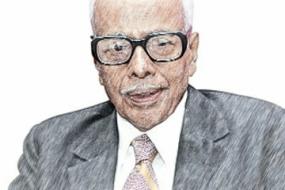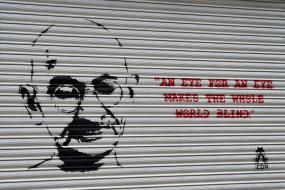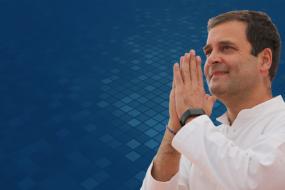What...
Who...
Why...
How...
When...
Where...
Can I...
Does...
X < >
WHAT is The Billion Press?
The Billion Press is an initiative by journalists working to build an independent platform that can speak truth to power and work with a focus on people and voices who are often on the margins and rarely the focus of attention by what is sometimes called “mainstream” media. We are a section 8 (not-for-profit) company and have been running the venture since 2016. We bring our experience in journalism to the project and our point of view to our writings. We believe, among other things, that Gandhi must be better understood by all Indians, that democratic traditions have been weakened, that secularism is under attack and that a single-minded focus on GDP growth does not automatically mean decent jobs and better lives for the large mass of India.
WHO founded The Billion Press?
The Billion Press was founded by journalists Lekha Rattanani and Jagdish Rattanani, working with Savak Tarapore, a noted economist and a former Deputy Governor of the Reserve Bank of India. Tarapore was known for his work in support of the rights of ordinary citizens and to bring fairness in services and banking fees and charges to ordinary savers whose money powers the banking system. A career Central banker, Tarapore retired as the RBI Deputy Governor in 1996. He later started a syndicated columns service, writing in a style that was simple but never simplistic on issues of finance and banking. Every school student could understand what he wrote. His columns were carried by one of the Founders here, who then worked as the Business Editor for a Mumbai-based newspaper. Tarapore then pushed and helped Lekha and Jagdish set up an independent syndicated service for newspapers. The result is the Foundation of The Billion Press. We continue to run this service today, serving more than a dozen newspapers in various State capitals and building a unique audience for our edit page columns. Tarapore passed away on Feb. 02, 2016, before the Foundation was formally registered and launched.
WHY was The Billion Press founded?
A confluence of circumstances led us to found The Billion Press, including the push from Savak Tarapore, the early support we received from him to set up the Foundation, and our view that this was the right time to work in non-profit journalism and build a platform where we might be free to practice journalism as professionals. We wanted practice on our own terms. We were also clear early on in our mission to not be sold on dominant narratives, to keep up a healthy scepticism of some of the stories that officialdom sells and media houses tend to buy, to speak truth to power and to bring the focus back on everyday people, or as we put it in our statements, “a focus on people less seen, voices less heard and perspectives less argued.”
We see ourselves as a press for the billion and more who make up India, (hence ‘The Billion’ in our name), and particularly the disadvantaged, the weaker sections and the “backwards”. In other words, we are less interested in the glamour that is thrown at us, and more interested in the grime that is behind it and is sought to be hidden by glowing accounts of a uni-dimensional GDP growth story.
HOW is The Billion Press run?
The Billion Press is led by Lekha Rattanani as the Managing Editor, who brings more than three decades of journalistic work to the initiative. She has worked for, among others, Russi Karanjia’s Blitz, Free Press Journal, The Telegraph, India Today, Outlook. Jagdish Rattanani as the Editor comes with more than three decades of work in the profession, as also work as an academic at the noted B-School, SPJIMR; as a book author and editor of the series called "long-form conversations" and as a board member of a prestigious international organisation - the Association of Sustainability Practitioners, UK. Jagdish has worked for, among others, the Free Press Journal, Deccan Herald, The Telegraph, Business India Television, Zee TV News and long years as the Western Region correspondent for the world’s largest newswire, The Associated Press. Lekha and Jagdish work with a host of fellow writers, journalists, activists, academics to bring a diverse set of voices to The Billion Press. Some 100-odd senior leaders and writers support The Billion Press by writing for and through us. Our supporters are also the editors and edit page leaders of all the newspapers that regularly carry our columns on the edit and Op-Ed pages of newspapers.
WHEN did The Billion Press launch?
We were informally launched on Budget Day in 2016. Our formal launch date is 25th of June 2016, when we were registered as a Section 8 company under India’s Companies Act. Since then, we have published online and in various print media more than 1.5 million words of news columns, commentary, analysis focused on key issues and put out by a diverse set of voices. We have recently, in 2023, launched a new initiative called ‘Gosh!’ through which we seek to publish commentary to help us correct all the misrepresentation and misguided commentary and views related to the father of the nation, Mahatma Gandhi.
WHERE is The Billion Press based?
We are based in Mumbai, but location is less important at a time when news is everywhere and sources of content creation as well dissemination abound. Our registered address remains in Mumbai, but we travel freely and often for our work and for a host of new projects that are underway.
CAN I write for you?
Typically, no. At this stage, we are unable to process unsolicited m1aterial. We do still get many people writing-in on our general email ids but we have rarely if at all been able to use these pieces. We make it clear this is our weakness, not our strength. Good writing comes in from all sources, not from people known to us or from a select club or people with labels/designations attached to them. There is already a labels-related bias in the Indian media. Designations are received better than plain people, we fear. One of our aims is to work with a very diverse group and our writers’ base is indeed diverse, but we also realise we will need time to be able to handle the flood of requests and sort through them, should we open up even more.
We will therefore likely stay a restricted place in terms of our set of writers at this stage. We do support efforts to reach us through our website forms to offer ideas, and we will take them up as and when this is possible. It might be better to write in through the website contact form and make an offer for writing, discussing a specific piece and background rather than sending in the piece itself.
DOES The Billion Press take outside funding?
We have raised no money from outside sources in the nine years of our existence. We run with funds put in either by the founders, who work without any remuneration for the initiative and serve as Directors, or our funds come in the form our internal accruals through the business of writing columns for the print media and being paid for these. We do have plans for larger projects for which we will seek to raise funds as a non-profit. Several writers for us work pro bono, notably those who know us, our background as journalists for more than three decades, and have seen us struggle to set up the initiative and the mission that we seek to live through the organisation. Some writers receive token payments for their contributions.





























